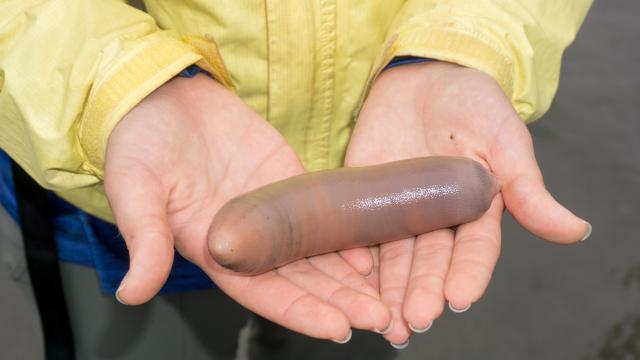You know the world is ending when dicks start to take over entire beaches. No, I’m not talking about a penis havers-only nude beach. I’m talking about the fat innkeeper worm, or Urechis caupo if we’re talking sexy. The best version of its name, though, is penis fish because this worm looks like a fucking dick, man. And thousands of these pink uncircumcised dick lookalikes covered the shores of Drakes Beach at Point Reyes near San Francisco last week, leaving one man extremely puzzled.
David Ford was walking around, enjoying his day when he came upon a grizzly scene: Seagulls gobbling down what appeared to be hundreds of giant penises, according to Motherboard. That many dicks don’t just wind up strewn across a beach, though, so Ford turned to Bay Nature, which helps identify organisms, to find out WTF was for seagull lunch. There, biologist Ivan Parr had just the answer:
The fat innkeeper worm (Urechis caupo) is a type of spoonworm (Ehciuroidea), an order of non-segmented marine worms identified by a spatula-shaped proboscis used for feeding and sometimes grasping or swimming. The fat innkeeper’s family (Urechidae) contains only four species worldwide, collectively known as either innkeeper worms or, well, penis fish. This is why we prefer scientific names. U. caupo is the sole representative in North America, found only from Southern Oregon to Baja, with the bulk of sightings between Bodega Bay and Monterey. So, whether or not you feel privileged by its presence, U. caupo is an almost uniquely California experience, perhaps having the best claim for State Worm.
Well Ivan, I prefer to call them dick fish. But to each their own I guess.
But seriously, the most fascinating part about this entire fiasco is why these worms likely ended up dead on a beach in the first place. These marine worms prefer soft-sediment ecosystems, so they typically live in the sand not that far from shore. While this usually keeps them safe and sheltered, they can become vulnerable when storms roll through. If waves are strong enough, they can destroy the phallic fishes’ underground homes and send them piling up on beaches, exposing themselves to the world. That’s what Parr believes happened here.
And, as we all know, climate change is set to increase the severity and frequency of coastal storms and could even be leading to bigger waves. That could mean some pretty bad news for these sand-loving dicks. While climate change is not Parr’s expertise, the biologist told Earther in an email that “I think if there’s a greater frequency of storms, then it’s possible to expect seeing other events like this.”
Scientists aren’t clear on what that means for this species because they don’t know too much about their “population dynamics,” Parr told Earther. However, he pointed to a 2010 article that noted these stranding events aren’t likely to harm the population too much. And Parr believes there are plenty more worms hiding in the sand than the ones left stranded on the beach.
What does concern Parr, however, is that their burrows host other creatures like pea crabs, clams, shrimp, scale worms, and gobies (a type of tiny fish).
“So, for every fat innkeeper you see dead on the beach, you know that there’s a good chance 3-5 roommates were left homeless,” he said. “Some of them, particularly the goby, might be able to weather out the storm and find a new home. No doubt others were among the casualties.”
These worms main threats come from predators like the seagulls, otters, and even people. Climate change may just be its next one if Pacific storms rev up. So Californians, get ready. More penis (fishes) may be coming to a beach near you.
